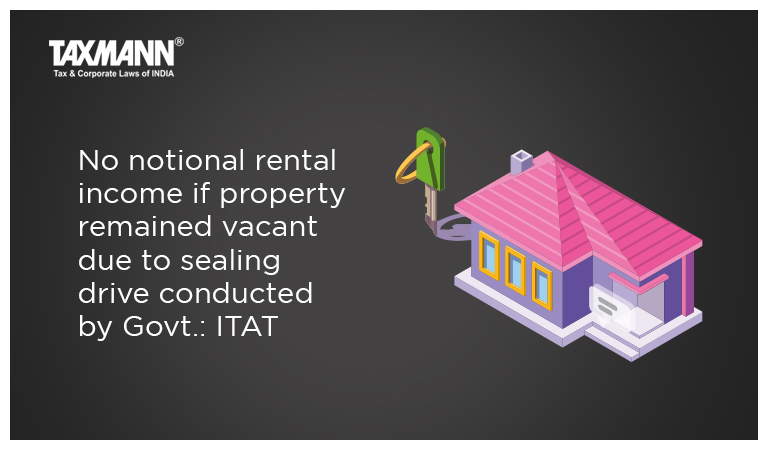No notional rental income if property remained vacant due to sealing drive conducted by Govt.: ITAT
- Blog|News|Income Tax|
- 3 Min Read
- By Taxmann
- |
- Last Updated on 19 July, 2022

Case Details: Kamal Kumar v. ACIT – [2022] 140 taxmann.com 106 (Delhi-Trib.)
Judiciary and Counsel Details
-
- Anil Chaturvedi, Accountant Member & Anubhav Sharma, Judicial Member
- Rajesh Malhotra, CA & Ms. Shivangi Kumar, Adv. for the Appellant.
- Ms Swati Joshi, CIT-DR for the Respondent.
Facts of the Case
The assessee owned a commercial house property that remained vacant during the whole of the previous year.
The assessee submitted before the Assessing Officer (AO) that the property was situated at Sultanpur, MG Road, and the same was not regularized. The Government of Delhi was having a ceiling drive on the unauthorized property and due to this ceiling drive tenants were not easily available in the area and that is why despite repeated efforts property could not be rented out.
However, AO rejected the submission and applied the provisions of section 23(1)(c) estimated the notional rent of the property at a certain amount, and added the same to the income of the assessee. On appeal, CIT(A) upheld the order of the AO. Aggrieved-assessee filed the instant appeal before the Tribunal.
ITAT Held
The Delhi Tribunal held that the material on record established that there was a genuine dispute in the locality where the commercial building of the assessee was situated. Further, that dispute was of such nature that no prudent person could be expected to have taken the disputed building on rent.
The provisions of section 23(1)(c) would not be applicable if there is a legal disability created by the action of municipal authorities or under the course of law restricting the rights of the property holder to let out the property.
The use of the word ‘receivable’ in section 23(1)(c) refers to the payment not being realized. It indicates that there should not be a mere possibility of receiving the rent but rent can become payable in all the probability, as the property is available for being given on rent. Then it can be considered to be ‘receivable’.
Therefore, the correct interpretation is that in case the property is vacant then the notional rent can be taxed if it can be considered as ‘receivable’ as mentioned in section 23(1)(a). When there is some legal disability or physical impossibility in creating a tenancy and due to which the property is left vacant, then there is no possibility of rent being realized. Accordingly, the rent cannot be said to be ‘receivable’, and thus on basis of notional rent, no tax liability can be created.
List of Cases Reviewed
-
- Vivek Jain v. Asstt. CIT [2011] 14 taxmann.com 146/202 Taxman 499/337 ITR 74 (para 7) distinguished.
List of Cases Referred to
-
- Premsudha Exports (P.) Ltd. v. Asstt. CIT [2008] 110 ITD 158/[2007] 17 SOT 293 (Mum. – Trib.) (para 4)
- Ms. Priyananki Singh Sood v. Asstt. CIT [2019] 101 taxmann.com 45/174 ITD 371 (Delhi – Trib.) (para 4.1)
- Empire Capital (P.) Ltd. v. Asstt. CIT [2020] 114 taxmann.com 180/181 ITD 173 (Mum. – Trib.) (para 4.1)
- Vivek Jain v. Asstt. CIT [2011] 14 taxmann.com 146/202 Taxman 499/337 ITR 74 (A.P.) (para 4.2)
- Dilip Kumar Chowdhary v. Asstt. CIT [IT Appeal No. 2460 (Kol.) of 2018, dated 8-5-2019] (para 4.2)
- Sachin R. Tendulkar v. Dy. CIT [2018] 96 taxmann.com 253/172 ITD 266 (Mum.) (para 4.3)
- DLF Ltd. v. Addl. CIT [2019] 106 taxmann.com 294 (Delhi – Trib.) (para 4.3)
- Sonu Realtors (P.) Ltd. v. Dy. CIT [2018] 97 taxmann.com 534/173 ITD 82 (Mum.) (para 4.3).
Disclaimer: The content/information published on the website is only for general information of the user and shall not be construed as legal advice. While the Taxmann has exercised reasonable efforts to ensure the veracity of information/content published, Taxmann shall be under no liability in any manner whatsoever for incorrect information, if any.

Taxmann Publications has a dedicated in-house Research & Editorial Team. This team consists of a team of Chartered Accountants, Company Secretaries, and Lawyers. This team works under the guidance and supervision of editor-in-chief Mr Rakesh Bhargava.
The Research and Editorial Team is responsible for developing reliable and accurate content for the readers. The team follows the six-sigma approach to achieve the benchmark of zero error in its publications and research platforms. The team ensures that the following publication guidelines are thoroughly followed while developing the content:
- The statutory material is obtained only from the authorized and reliable sources
- All the latest developments in the judicial and legislative fields are covered
- Prepare the analytical write-ups on current, controversial, and important issues to help the readers to understand the concept and its implications
- Every content published by Taxmann is complete, accurate and lucid
- All evidence-based statements are supported with proper reference to Section, Circular No., Notification No. or citations
- The golden rules of grammar, style and consistency are thoroughly followed
- Font and size that’s easy to read and remain consistent across all imprint and digital publications are applied



 CA | CS | CMA
CA | CS | CMA
